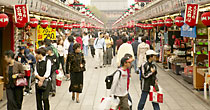Empowerment—The Story of the Grameen Bank in Bangladesh
by Donald Sutherland

Most of us feel overwhelmed, powerless, miniscule, and insignificant as we gaze out upon a world spinning toward environmental collapse. Every morning we wake up to stories of glaciers melting, polar bears drowning, and oceans thickening with plastic. The clean-up task just seems too large for ordinary mortals such as we.
If desperately poor, mostly illiterate, and often gender-oppressed women can become empowered to change their world, so can we. The story of the Grameen Bank is about empowerment. Muhammad Yunus was recently awarded the Nobel Peace prize for his very successful and extremely innovative micro credit initiative started in Bangladesh three decades ago. In accepting the prize Yunus said, “I believe putting resources into improving the lives of poor people is a better strategy than putting it into guns.”
Bangladesh is one of the poorest and most densely populated countries in the world, situated in South Asia bordered by Pakistan and India. Most Bangladeshis are rural and live on subsistence farming with an average income of less than $1 U.S. per day. According to a 2004 UNICEF report, literacy rates are 50% among men and 31% among women. What mainstream lender would step into rural Bangladesh and actively seek borrowers? Probably none. However, economist Muhammad Yunus did just that. He decided to recruit subsistence farmers, mostly illiterate women, as loan recipients and equip them with the business savvy to become entrepreneurs. He set up what he called the Grameen Bank. He insisted that women apply for small loans in groups of five unrelated persons and that every applicant agree to undertake a rigorous training program. An important part of the training program was to memorize and commit to practice 16 decisions. Examples of the decisions were: We shall adhere to the four principles of the Grameen Bank—discipline, unity, courage, hard work; We shall keep our families small, educate our children, build and use pit latrines, repair our houses, grow and eat vegetables all year round.
The majority of the loans were extremely small, often less than $1.00, sometimes pennies. No matter how small, each loan made a difference, another tiny step forward. Many steps added up to a huge economic and social change. For example, a $.50 loan purchased a package of good quality seed resulting in head lettuce for sale. A $1.50 loan purchased buttons and yarn resulting in the sale of a $2.00 blouse. With even a slim margin over cost, a previously poverty stricken woman was elevated to a position of power, able to bargain for a lower price for her supplies.
We need not wait for governments or corporate giants to invest large sums in environmental recovery. Each of us, with tiny steps, could together create a thundering avalanche of change. There are many examples—use low energy light bulbs, public transit, cloth shopping bags, seed our lawns to native grass, support farmer’s markets, and walk more. How about planting a tree for every 1,000 kilometres we drive or fly?
Reprinted courtesy of Earthcare Connections, PO Box 2800, Humboldt, SK S0K 2A0. Phone (306) 682-2407, fax (306) 682-5416, email: earthcare@sasktel.net, www.earthcare.sk.ca. Donald Sutherland is a career counsellor, personal coach, and mediator with special training in restorative justice. He is also a professional agrologist (PAg) and active farmer, email: donaldsutherland@sasktel.net. |
